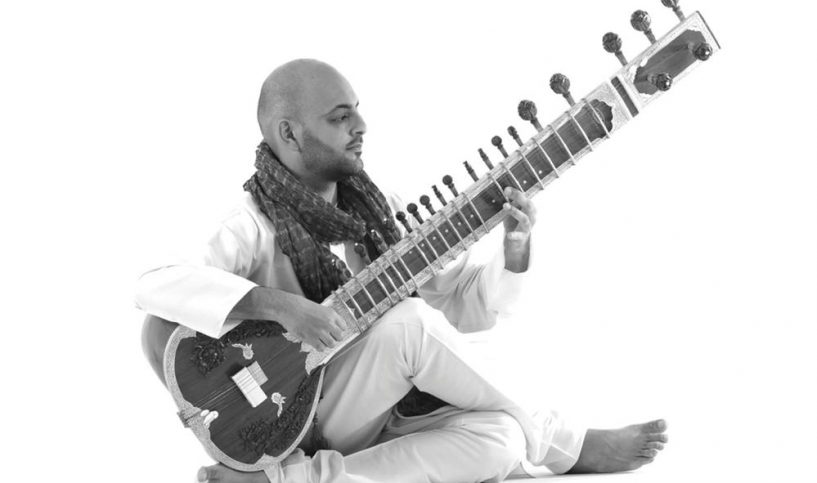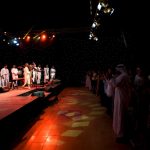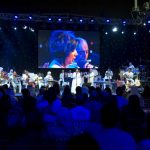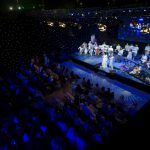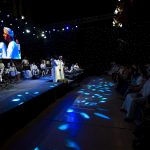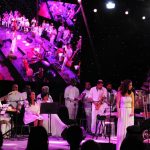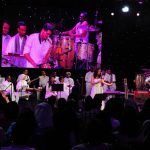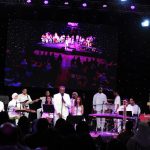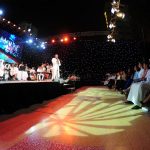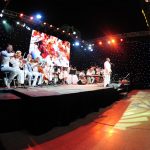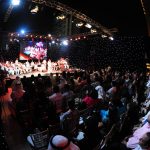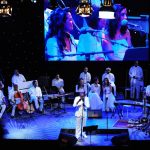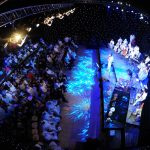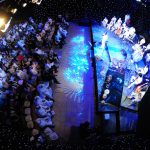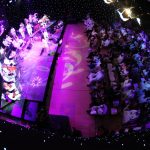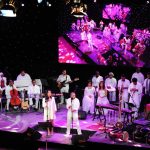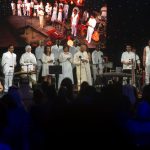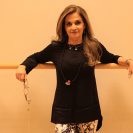If you were driving along the Gulf Road around Salmiya at the beginning of May, chances are you may have seen spotlights painting the dark night sky. You may also have heard music emanating from the source of those lights…
The root of both these things – the light and the sound – was Bayt Lothan. This traditional Kuwaiti house, not 100 metres from the Arabian Gulf, has been one of the beacons of the arts and culture scene in Kuwait for around twenty years – serving the community through the arts. Continuing in this tradition, the evening in question was one of music, but it also felt like so much more than that.
Half Kuwaiti, half Indian/Portugese, Nawaf Gheraibah is a living, breathing representation of the multiculturalism of Kuwaiti society. That he is a musician only serves to further remind people of the rich musical traditions so present in Kuwait’s history that may have been forgotten in recent times. As a musician who enjoys breaking through cultural boundaries with his music, Nawaf seems perfectly positioned to bring music to his people, and Bayt Lothan, the obvious platform.
Entering the courtyard that evening, the space was barely recognizable as the traditional landmark that we’ve come to know and love. Seating for four hundred people was laid out in front of an ample stage, and behind, a full audio mixing desk was set up to record the night’s performance. A mini crane holding a movie camera floated around overhead preparing to capture, along with two roaming cameramen, the entire evening’s proceedings to be issued as a DVD later. The courtyard was enveloped by heavy black curtains – studded with star-like stones that shone like a continuation of the night sky – rippling in the breeze, easing the humidity. Atop the curtains, an industrial light rig illuminated everything. It was refreshing to learn that two Kuwait companies were responsible for all this – Camco Global provided the stage, lights and sound recording, while Eagle Vision Media Group were taking care of the filming and production. This was truly an inspiring and professional space. The arriving audience – a mixture of Kuwaitis and expats – all seemed stunned and excited by what they encountered. The multitude of instruments, and size of the stage itself, only further elevated our curiosity. A large screen behind the stage showed artwork designed by Nawaf’s wife Dalal Alomairi (who also helped Nawaf with his lyrics) and animation by Nawaf Al-Ali and Nawaf Al-Shaheen. The illustration of a tree, colourful leaves gently swaying above primitive musicians, encapsulated the mood perfectly.
Bayt Lothan though, wasn’t Nawaf’s first call when he returned to Kuwait and was trying to put his performance together. Farah Al-Sabah of Bayt Lothan was a little baffled by this, as Nawaf had been a teacher at Bayt Lothan before heading off to the UK for postgraduate studies. At the University of Southampton Nawaf had created the album Bija as an expression of his own multiculturalism and as an exploration of the evolution of music throughout the world. His intention now was to stage an expanded performance of Bija with full orchestra here in Kuwait. Ambitious indeed, but Nawaf also has a locally established reputation too. In 2011 The National Council of Culture, Arts, and Literature, Kuwait awarded him the prize of best Kuwaiti composer and he currently works as an instructor at The Higher Institute of Musical Arts, Kuwait.
After coming to his senses and with Bayt Lothan on board, Nawaf’s job would now be somewhat easier – Farah’s job suddenly got a lot harder, though. Bayt Lothan is a private non-profit organization and so to stage a performance on the scale that they planned would require money in the form of sponsorship.
When Nawaf Gheraibah took to the stage a little after eight he was joined by twenty-five other people. The majority of these musicians were Kuwaiti students, but there were also musical students from other Arab countries. Nawaf had put this orchestra together only a few months previously and had been rehearsing with them at Bayt Lothan daily. He outlined the concept behind what we would experience and explained that Bija was a Sanskrit term for ‘seed’. He was the seed, so too his music, but a seed cannot grow without water and this is what he considered his orchestra to be – the water that would bring his seed to life. He then went on to thank Bayt Lothan and (much to her embarrassment, as she considers herself only a mere part of what Bayt Lothan does) Farah Al-Sabah herself. He then went on to thank the sponsors…
Bayt Lothan has an established reputation and usually securing funds for any of their events or programmes is not overly difficult. There is a long list of companies and individuals in Kuwait who are, with a little gentle persuasion, more than willing to support the arts. This is part of the reason why Bayt Lothan is such a successful organization. When Farah told people she was putting on a music concert though, the support was less forthcoming. This seems to be a crucial time to stage something of this ilk, and through the very generous support of Burgan Bank, Al Mulla Exchange, and Al-Soor Financing and Leasing, the idea started to become a reality. Four more sponsors, Wimd Wireless Mobile Data Co., Lulua Publishing, Bader Sultan & Brothers Company, and Taiba Hospital ensured the night could go as planned. Farah had to work tirelessly though, still securing funds up until a week before the performance. It’s encouraging to know there are people who can focus on what is important to us as a society and want to support such causes, no matter what is happening peripherally.
Then of course there was the music. A blend of ethnic instruments including the Aboriginal didgeridoo, the Indian sitar and the Arabian lute were played alongside more modern instruments like electric guitar, saxophone and even an instrument never before played live in the Arabian Gulf – the Avant-garde zen tambour. The sounds were a wonderful tapestry of world music with jazz, blues, folk, rock influences. One song, an ode of love to Nawaf’s wife even featured one of my favorite instruments, the ukulele. Nawaf mixed traditional poems with modern music styles and fused regional and international sounds to create something truly unique. The power of his singers, who performed his arrangements with such emotion, bellowed out into the ether above, transporting the audience to a world where everything can co-exist in harmony.
It was an evening of music but there was so much more to it than that. This was a triumph of will. Music has been a form of human expression for millennia; let’s hope it continues to be so.
Bayt Lothan is located on Gulf Road next to Marina Mall. For more information, visit baytlothan.org or call 2575 5866. You can also follow them on twitter @Bayt_Lothan.



